7 Best Biotech Stocks to Build Your Portfolio
Investing in biotech stocks can be tricky due to their volatile nature. That's why we turned to Wall Street's pros to find these top-rated picks.


Profit and prosper with the best of Kiplinger's advice on investing, taxes, retirement, personal finance and much more. Delivered daily. Enter your email in the box and click Sign Me Up.
You are now subscribed
Your newsletter sign-up was successful
Want to add more newsletters?

Delivered daily
Kiplinger Today
Profit and prosper with the best of Kiplinger's advice on investing, taxes, retirement, personal finance and much more delivered daily. Smart money moves start here.

Sent five days a week
Kiplinger A Step Ahead
Get practical help to make better financial decisions in your everyday life, from spending to savings on top deals.

Delivered daily
Kiplinger Closing Bell
Get today's biggest financial and investing headlines delivered to your inbox every day the U.S. stock market is open.

Sent twice a week
Kiplinger Adviser Intel
Financial pros across the country share best practices and fresh tactics to preserve and grow your wealth.

Delivered weekly
Kiplinger Tax Tips
Trim your federal and state tax bills with practical tax-planning and tax-cutting strategies.

Sent twice a week
Kiplinger Retirement Tips
Your twice-a-week guide to planning and enjoying a financially secure and richly rewarding retirement

Sent bimonthly.
Kiplinger Adviser Angle
Insights for advisers, wealth managers and other financial professionals.

Sent twice a week
Kiplinger Investing Weekly
Your twice-a-week roundup of promising stocks, funds, companies and industries you should consider, ones you should avoid, and why.

Sent weekly for six weeks
Kiplinger Invest for Retirement
Your step-by-step six-part series on how to invest for retirement, from devising a successful strategy to exactly which investments to choose.
Biotech stocks were some of the best performers at the start of the pandemic. More recently, though, they've vastly underperformed the broader market.
Case in point: In 2021, the SPDR S&P Biotech (XBI) lost 20.5%, compared to the S&P 500's 26.9% gain. And in 2022, the XBI is currently down 27.1%, while the S&P 500 has lost 10.4%.
Part of this underperformance can be blamed on the high number of small, early stage biotech companies that took advantage of the economic recovery and a red-hot initial public offering (IPO) market. In 2021, 96 biotech companies entered the public market, compared to just eight in 2011. Many of these companies had just a few patents and little to no revenue.
And while many biotech stocks fail due to a lack of product efficacy or safety, the industry continues to attract investors because the companies that are able to successfully develop effective treatments can see their stock prices skyrocket. Further, the biotech industry is constantly innovating and improving upon existing treatments.
Perhaps most intriguing about biotech stocks is that they are disconnected from geopolitical risk and economic uncertainty – two themes dominating current headlines.
So while it's no secret that investing in this industry is volatile and challenging, there is opportunity. But figuring out which biotech stocks to invest in can be tricky. One tool to help investors sift through the noise is the Stock News POWR Ratings system, which utilizes 118 different factors to determine which stocks are most likely to outperform.
With this in mind, here are the seven of the best biotech stocks to add to your portfolio. Each is rated a Buy or Strong Buy in the POWR Ratings System due to their respective strength across a variety of measures, including valuation, sentiment and fundamentals.
Data is as of April 25. Dividend yields are calculated by annualizing the most recent payout and dividing by the share price.
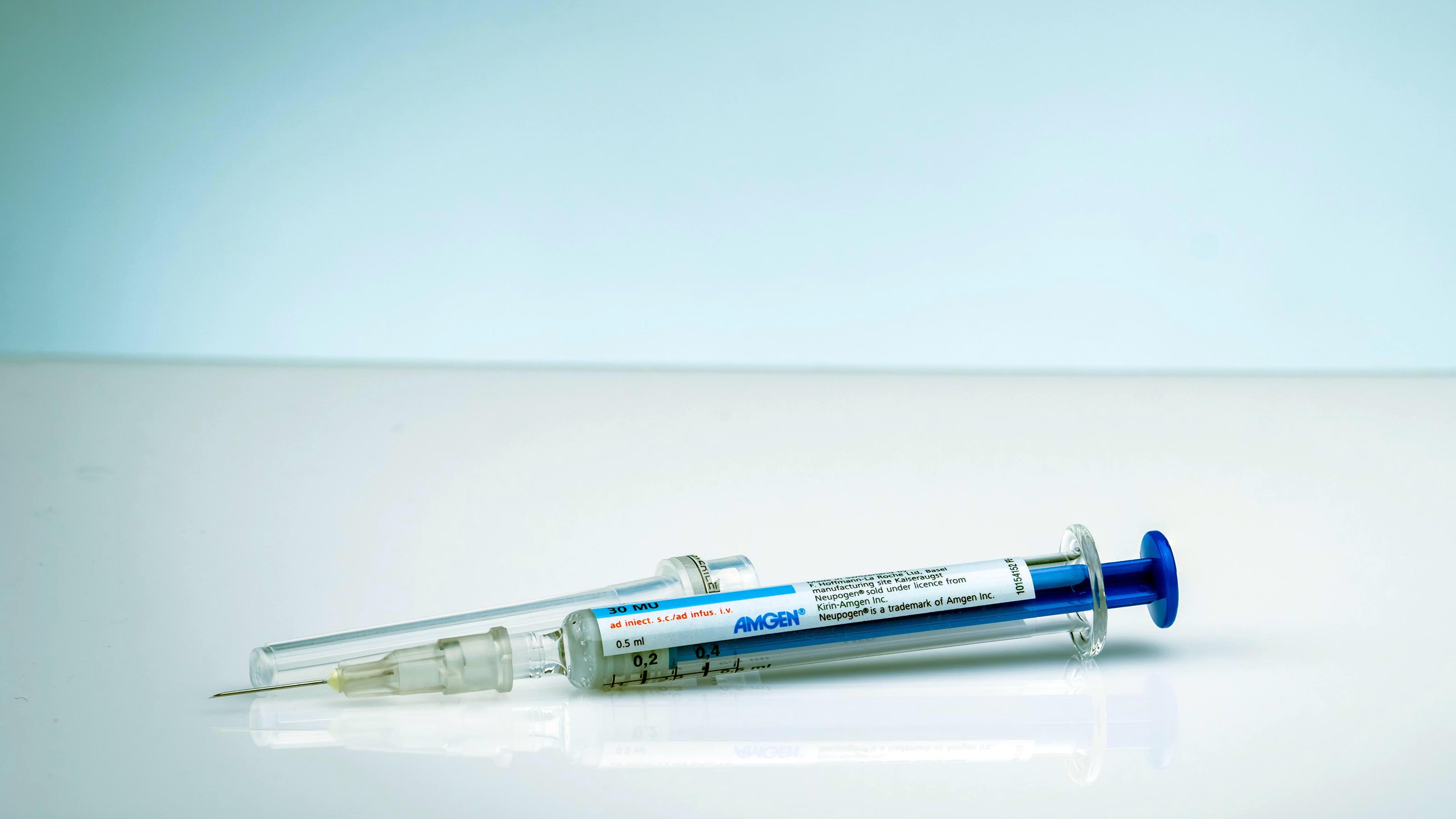
Amgen
- Market value: $134.6 billion
- Dividend yield: 3.1%
- POWR Ratings overall rating: B (Buy)
- POWR Ratings average broker rating: 2.65
Amgen (AMGN, $252.17), founded in 1980, is a pioneer in biologics. Total product sales accounted for 93.5% of AMGN's 2021 revenues. The company's three top-selling drugs are Enbrel for inflammatory diseases, Prolia for osteoporosis and Otezla for plaque psoriasis. These three drugs made up more than 38% of AMGN's sales last year.
The company also derives the vast majority of its revenues from America. This concentration in AMGN, in terms of its products and geography, does pose risks that investors should consider. For instance, another company could start selling a better or cheaper drug that addresses the same issues. Another potential risk is if a deal is made in Congress that lowers the price of prescription drugs, which would undermine Amgen's margins.
On the other hand, it's also an opportunity as AMGN's international sales have been steadily growing, with the company showing particularly strong growth in the Asia-Pacific region. The Dow Jones stock also has a proven record of making successful partnerships and acquisitions to ensure growth and keep its pipeline well-stocked.
Examples include Amgen taking a 20.5% stake in BeiGene (BGNE) in 2019, which gave it entry into the Chinese oncology market. That same year, AMGN acquired the drug Otezla from Celgene. And last year, it bought Five Prime Therapeutics that gave it bemarituzumab, a treatment for gastric cancer that is currently in a Phase III trial.
This merger-and-acquisitions (M&A) strategy is essential for Amgen as the company is losing patent protection for several products over the next decade – including for its blockbuster drug Prolia. But Amgen has plenty of future growth drivers in its lineup, including in drugs such as tezepelumab, sotorasib and KHK4083.
Tezepelumab is an asthma treatment that gained approval from the Food and Drug Administration (FDA) last year. It's also being studied as a treatment for other diseases including chronic obstructive pulmonary disease and chronic rhinosinusitis. Sotorasib also recently got FDA approval to treat a specific type of lung cancer, while KHK4083 is in a late-stage trial to study its effect on inflammatory diseases.
AMGN has shown steady growth in recent years and its 2021 results were no different. For the full year, AMGN recorded earnings of $17.10 per share and revenue of $26 billion, up 6% and 2.1% year-over-year, respectively. This year, analysts are forecasting a modest improvement to $17.65 in earnings per share (EPS) and $26.2 billion in revenue.
Amgen has an overall rating of B (Buy) in the POWR Ratings system. B-rated stocks have posted an average annual performance of 20.1% since 1999, which outpaces the S&P 500's average 8% annual gain. AMGN is one of the best biotech stocks in terms of Quality, earning an A for its POWR Grade, due to its strong balance sheet, low debt and well-regarded management team. See the complete POWR Ratings for AMGN.

Biogen
- Market value: $31.5 billion
- Dividend yield: N/A
- POWR Ratings overall rating: B (Buy)
- POWR Ratings average broker rating: 2.19
Biogen (BIIB, $214.54) focuses on developing therapies and treatments for neurological and neurodegenerative diseases such as multiple sclerosis (MS), Alzheimer's, dementia, Parkinson's and spinal muscular atrophy. These include Tecfidera, Vumerity, Spinraza and Fumaderm to name a few.
Over the past year, BIIB stock is down 20%. A major factor in share-price decline is the controversial approval of its Alzheimer's disease drug, Aduhelm. The treatment has failed to generate much traction in the market as there remain questions about its efficacy, and so far, many insurers and the Centers for Medicare and Medicaid Services (CMS) are not covering it. Last quarter, it only generated $1 million in sales. The drug was also rejected by Japanese and European authorities.
Another challenge for the healthcare stock is that Tecfidera, its MS drug, is now facing generic competition. Last year, the treatment accounted for about 25% of Biogen's total revenue, but is expected to see a significant decline in sales this year.
To counter this, the company has been aggressively making deals to bolster its pipeline. Over the last five years, BIIB has made over 20 acquisitions, licensing or development deals.
Currently, it has a candidate in clinical trials, BAN2401, which is targeted toward early onset Alzheimer's disease, dementia and cognitive impairment. Phase III trials are ongoing and expected to last until 2024. However, there is some hope of accelerated approval due to positive safety data.
Last year, BIIB reported an 18% decline in revenue to $11.0 billion – due in part to Tecfidera's expiring patent. This year, analysts expect revenue to fall another 10% to $9.9 billion. The stock price seems to have already priced in this deceleration as it's down 55% from its all-time high in June 2021, hit following the FDA approval of Aduhelm.
As such, BIIB has a Value Grade of A in the POWR Ratings system, part of its overall B (Buy) rating. The stock's forward price-to-earnings (P/E) ratio of 13.6x is significantly cheaper than the S&P 500.
Biogen also has a Quality Grade of B due to being one of the leading biotech stocks developing treatments for neurological diseases, even with its Aduhelm setback. It also has consistent royalty revenue for many of its franchises including MS drug Ocrevus, which saw a 29% increase in the last quarter. Plus, BIIB has a strong balance sheet with minimal debt and nearly $3 billion in cash. Get the full rundown of BIIB POWR Ratings analysis.
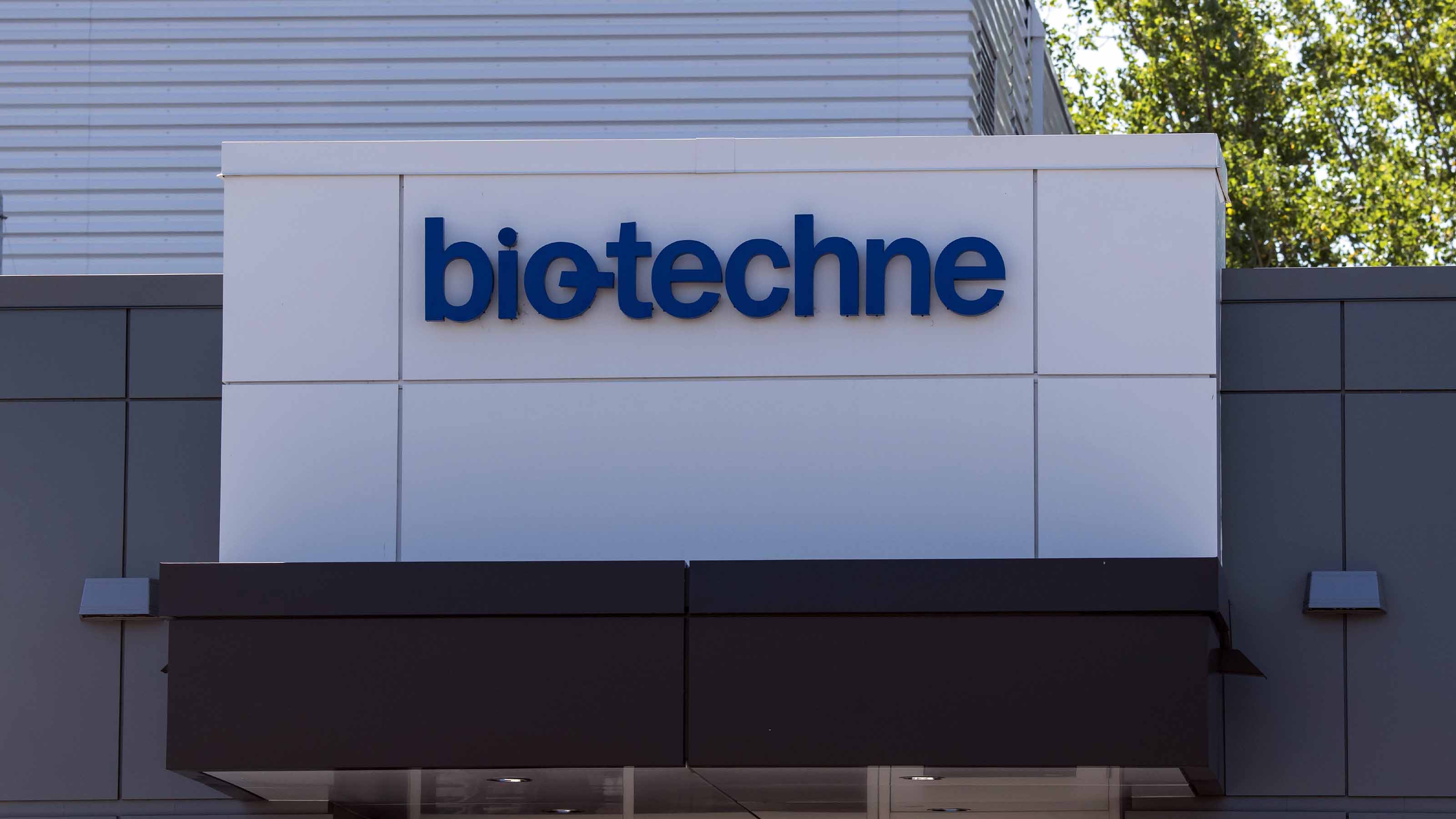
Bio-Techne
- Market value: $15.8 billion
- Dividend yield: 0.3%
- POWR Ratings overall rating: B (Buy)
- POWR Ratings average broker rating: 1.22
Bio-Techne (TECH, $400.91) is a supplier and manufacturer of biological materials like high-quality purified proteins and reagents like cytokines, growth factors and antibodies. These are used by pharmaceutical and biotech companies for their drug development and testing processes, specifically for genetic and cellular-based therapies. In addition to this, TECH also provides instruments and custom manufacturing solutions.
Thus, TECH provides investors with exposure to the genomics industry which is expected to grow at a roughly 14% rate over the next decade, according to research firm Research and Markets. And as a supplier to the industry, it has less risk than other biotech stocks that use genomics to develop drugs and bring them to market.
Given this potential upside, it's not surprising that Bio-Techne is richly valued with a forward P/E ratio of 44.3x.
Still, TECH is displaying strong momentum, as evidenced by its recent earnings report which showed a 17% year-over-year increase in revenue in the final three months of 2021. And adjusted earnings jumped 16% from the year prior to a record $1.88 per share. It also announced a $400 million share buyback and achieved a milestone with revenues exceeding $1 billion on a trailing twelve-month basis.
In 2022, analysts are forecasting $7.95 in EPS and $1.1 billion in revenue which would be year-over-year improvements of roughly 18% each. Margins are also expected to trend higher with increasing volume. Bio-Techne has a good mix of slow and steady expansion from its older reagent business with strong growth, albeit from a small base, in its genetic and cell therapy products.
TECH boasts a B (Buy) rating in the POWR Ratings system – due in part to a Sentiment Grade of B, which it earns from a bullish Wall Street analyst community. Five of six covering analysts call the stock a Buy, with a consensus price target implying 30% upside to current levels.
Bio-Techne also has a Quality Grade of B. This is thanks to a strong balance sheet and returning cash to shareholders through dividends and buybacks while staying on a growth trajectory. Take a closer look at TECH's full POWR Ratings.

Harmony Biosciences Holdings
- Market value: $3.0 billion
- Dividend yield: N/A
- POWR Ratings overall rating: B (Buy)
- POWR Ratings average broker rating: 1.40
Harmony Biosciences Holdings (HRMY, $50.03) develops and designs drugs for rare neurological disorders. The company was founded in 2017 and made its public debut in 2020 at a valuation of $1.5 billion. Since its IPO, HRMY is up nearly 30%.
HRMY has one product on the market, WAKIX, but it's been remarkably successful. The drug is used to treat adult patients with narcolepsy and helps reduce excessive daytime sleepiness.
As a result, the company is in the midst of an earnings boom. In its most recently reported quarter, HRMY posted adjusted earnings of 63 cents per share, which beat estimates for earnings of 32 cents per share and marked a significant improvement over the 25 cents per share Harmony Biosciences reported in Q4 2020. Revenue for the three-month period was higher by 62%.
Wall Street analysts are forecasting more growth in 2022. They see $1.94 in EPS and $443.5 million in revenue for the full year, compared to 2021's 58 cents per share in earnings and $305.4 million in sales. And for fiscal 2023, analysts expect $5.06 in EPS and $794 million in sales – which makes the stock quite cheap on a forward-looking basis.
Another positive catalyst is likely to be higher margins with increased volumes. The company is also working on getting WAKIX approved for other types of cognitive disorders. Management has also discussed using free cash flow – or the money left over after a firm has met its financial obligations – to acquire other companies or assets to stock its pipeline.
HRMY has an overall B (Buy) rating in the POWR Ratings system. Included in this score is a Growth Grade of B amid expectations for double-digit earnings and revenue growth over the next couple of years. Check out the complete POWR Ratings for HRMY, including a deeper dive into its component scores.
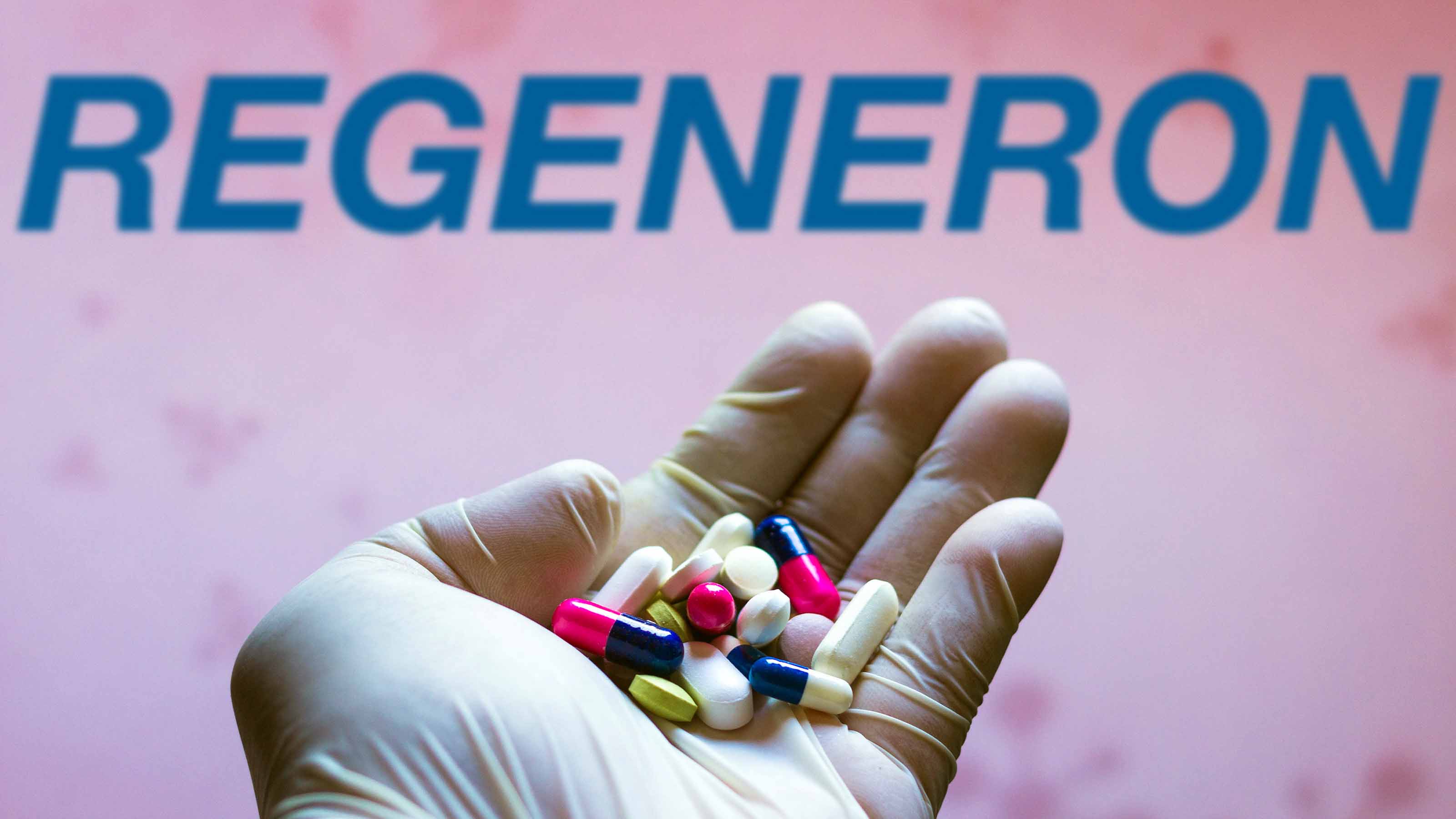
Regeneron Pharmaceuticals
- Market value: $75.8 billion
- Dividend yield: N/A
- POWR Ratings overall rating: B (Buy)
- POWR Ratings average broker rating: 2.00
Regeneron Pharmaceuticals (REGN, $690.33) is one of the best biotech stocks in terms of technical performance. Shares are up roughly 40% in the last 12 months, compared to a 20% decline for the iShares Biotechnology ETF (IBB). A major factor is REGN's COVID-19 treatment, REGEN-COV, which contributed $6.2 billion in revenue in 2021.
It's likely that REGEN-COV could have a smaller impact on Regeneron's top line going forward, though, considering it failed to show efficacy in terms of dealing with the omicron variant. Another factor is Pfizer's (PFE) Paxlovid pill, which has shown strong evidence of reducing death and hospitalization and is effective against omicron.
However, the stock's outperformance has continued despite this headwind due to its growth and presence in many other large markets. These include cancer, cardiovascular issues, eye disease, inflammation and asthma. Its most well-known products are Eylea for macular degeneration, Praluent to help manage cholesterol levels and Dupixent for asthma.
Eylea is the company's largest contributor to revenue – adding $5.8 billion to REGN's bottom line last year – and it's being prescribed for diseases beyond macular degeneration such as diabetic macular edema and macular edema. Due to an aging population and increasing rates of diabetes in developed countries all over the world, sales should keep rising.
Another catalyst is that Eylea's Phase II trials for high-dose usage showed positive results and Phase III results are expected later in the year.
In all of 2021, REGN had $16.1 billion in revenue, an 89% increase over 2020. Without its coronavirus treatment, revenue growth would have been 19%. For fiscal 2022, analysts are forecasting $11.7 billion in revenue, though the company is expected to return to growth in 2023.
Regeneron is another of the B-rated biotech stocks in the POWR Ratings universe, which equates to a Buy. Included in this score is a Quality Grade of B, due to the company's track record of successful drug development and patent protection for core products.
REGN also boasts a Value Grade of B. Concerns over slowing revenue growth in the short term have pressured shares in recent weeks, and the stock is currently trading at just 13 times analysts' average fiscal 2023 earnings estimate – well below the S&P 500's forward P/E ratio of 19.2x. Here are the complete POWR Ratings for REGN.

Corcept Therapeutics
- Market value: $2.4 billion
- Dividend yield: N/A
- POWR Ratings overall rating: A (Strong Buy)
- POWR Ratings average broker rating: 1.83
Corcept Therapeutics (CORT, $22.76) researches and develops drugs to target severe disorders that are due to unstable cortisol levels. Cortisol is the body's stress hormone and it can create adverse effects on health if not properly modulated, specifically in areas like metabolism, mental health and cancer.
Corcept Therapeutics went public in 2004 at a valuation of $49 million with a single compound that was the basis for Korlym, which is the company's sole product. Currently, the firm has a valuation of $2.5 billion with $366 million in sales over the last 12 months.
CORT received approval for Korlym in 2012, and it has steadily grown since then as an approved treatment for adult patients with endogenous Cushing's syndrome, suffering from type 2 diabetes. The company is working on approval for additional indications that could potentially increase the total addressable market for Korlym. For Cushing's, the drug has been given orphan status that gives it exclusivity until 2037, although it is being challenged by generic drug manufacturers.
The company also has four different drug candidates that are in different stages of clinical trials. Most promising is Relacorilant, which could be an improvement over Korlym due to fewer side effects and has also shown some positive effects against several cancers. Another potential blockbuster is Exicorilant which is in Phase 1 and 2 trials as a treatment for castration-resistant prostate cancers.
CORT is the first of the A-rated (Strong Buy) biotech stocks in the POWR Ratings universe featured here. A-rated stocks have posted an average annual performance of 31.1% since 1999, which compares favorably to the S&P 500's average annual 8% gain.
Part of the stock's overall rating is a Value Grade of B as it sports a low forward P/E ratio of 11.7x, has not debt and boasts above-average profit margins of 30%. Corcept Therapeutics also has a Quality Grade of A due to its well-regarded management team, strong balance sheet and stock buybacks to the tune of $200 million. Check out the full POWR Ratings for CORT.

Incyte
- Market value: $16.9 billion
- Dividend yield: N/A
- POWR Ratings overall rating: A (Strong Buy)
- POWR Ratings average broker rating: 2.07
Incyte (INCY, $76.56) was founded in 2002 by a team of scientists to discover and develop small-molecule drugs, monoclonal antibodies and bispecific antibodies. So far, the company has developed a wide variety of drugs with applications in oncology, dermatology, autoimmune diseases and targeted therapies.
Its leading seller is Jakafi, a treatment for two types of blood cancer. Its uses include myelofibrosis, polycythemia vera and aGVHD. Other major contributors to revenue are Olumiant for rheumatoid arthritis, Iclusig for leukemia, Pemazyre for bile duct cancer, Tabrecta for lung cancer and Monjuvi for diffuse large B-cell lymphoma.
INCY has patent protection for Jakafi until 2027 and it continues to see expanded use for other indications. However, this fear of a "patent cliff" has likely contributed in part to its stock price underperformance over the last two years despite rising revenues.
Specifically, INCY is up 13% since mid-March 2020, while the S&P 500 has spiked 83%, and IBB has returned 25%. And since Q2 2020, INCY's revenues are up 25% and EPS have nearly doubled. This top- and bottom-line growth is expected to continue, with analysts forecasting increases of 14% and 25%, respectively, this fiscal year.
And Incyte has a promising pipeline which could help ease the blow of the expiry of Jakafi's patent protection down the road. One potential is Opzelura – a dermatology drug that had around 19,000 new patients in Q4 2021 and is in late-stage trials for several skin conditions. The company is also partnering with Novartis (NVS) and Eli Lilly (LLY) on increasing the distribution of its treatments to Europe and Japan.
Not only is Incyte a top pick among billionaire investors, but it is also another of the A-rated (Strong Buy) biotech stocks in the POWR Ratings system. INCY has a Sentiment Grade of B as eight out of 14 Wall Street analysts have a Buy or Strong Buy rating on the stock, with only two deeming it a Sell.
INCY also has a Quality Grade of B due to its strong balance sheet, large cash holdings and impressive 94.9% gross margins – higher than its fellow biotech stocks and the broader market. Check out the complete POWR Ratings for INCY.
Profit and prosper with the best of Kiplinger's advice on investing, taxes, retirement, personal finance and much more. Delivered daily. Enter your email in the box and click Sign Me Up.

Jaimini Desai has been a financial writer and reporter for nearly a decade. He has helped countless investors take profitable rides on some of the hottest growth trends. His previous experience includes writing for Investopedia, Seeking Alpha and MT Newswires.
He is the Chief Growth Strategist for StockNews.com and the editor of the POWR Growth and POWR Stocks Under $10 newsletters.
-
 Betting on Super Bowl 2026? New IRS Tax Changes Could Cost You
Betting on Super Bowl 2026? New IRS Tax Changes Could Cost YouTaxable Income When Super Bowl LX hype fades, some fans may be surprised to learn that sports betting tax rules have shifted.
-
 How Much It Costs to Host a Super Bowl Party in 2026
How Much It Costs to Host a Super Bowl Party in 2026Hosting a Super Bowl party in 2026 could cost you. Here's a breakdown of food, drink and entertainment costs — plus ways to save.
-
 3 Reasons to Use a 5-Year CD As You Approach Retirement
3 Reasons to Use a 5-Year CD As You Approach RetirementA five-year CD can help you reach other milestones as you approach retirement.
-
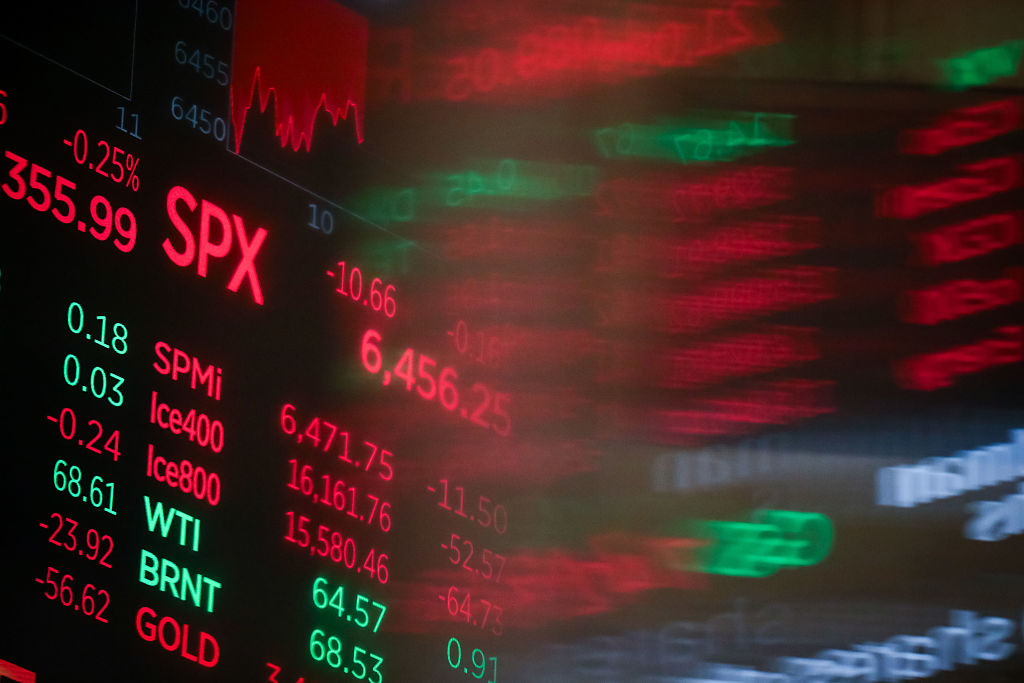 Dow Hits New High Then Falls 466 Points: Stock Market Today
Dow Hits New High Then Falls 466 Points: Stock Market TodayThe Nasdaq Composite, with a little help from tech's friends, rises to within 300 points of its own new all-time high.
-
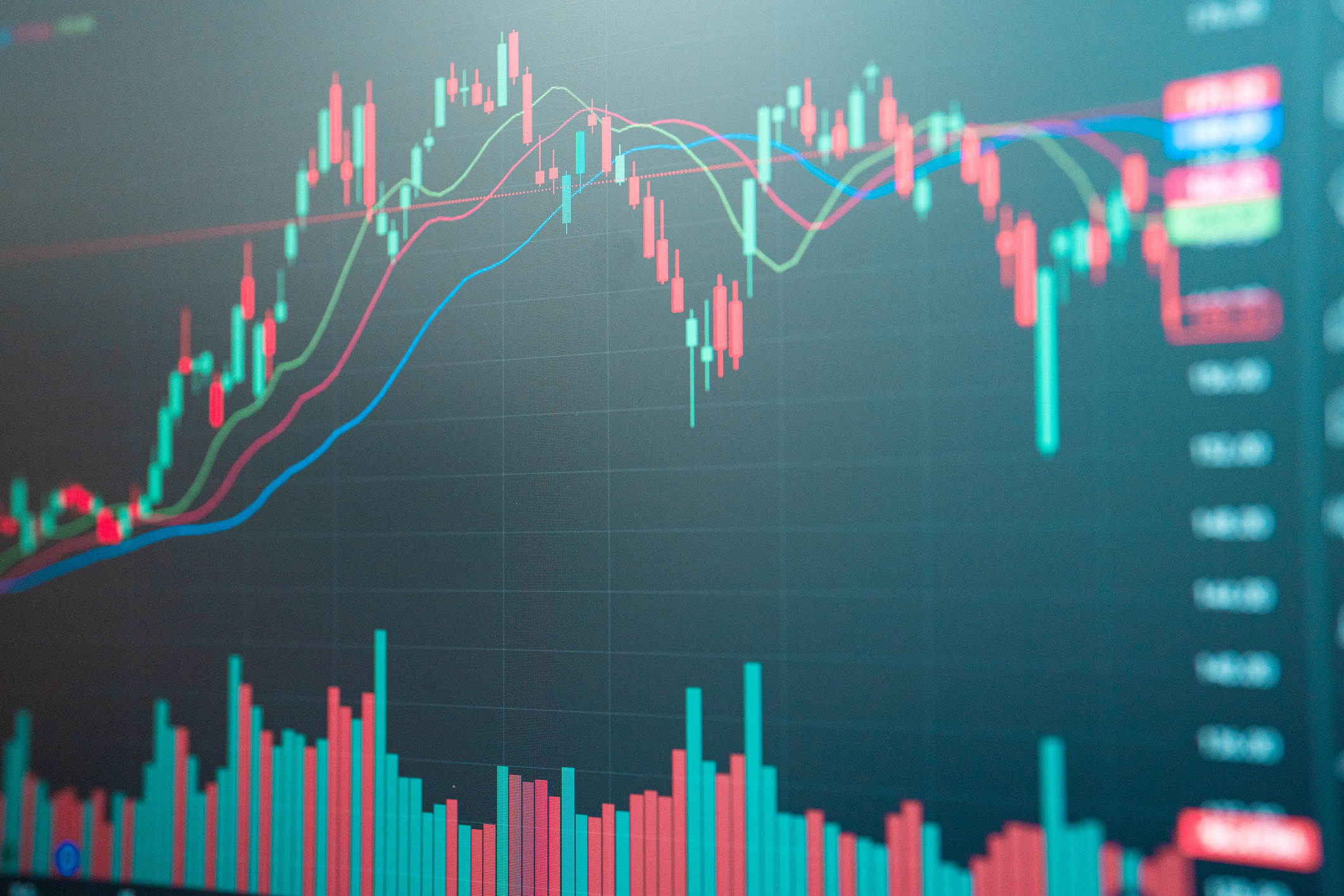 Dow Climbs 559 Points to Hit a New High: Stock Market Today
Dow Climbs 559 Points to Hit a New High: Stock Market TodayThe rotation out of tech stocks resumed Tuesday, with buying seen in more defensive corners of the market.
-
 Stocks Rally as Investors Buy the Dip: Stock Market Today
Stocks Rally as Investors Buy the Dip: Stock Market TodayMost sectors are "go" only a day after talk of bubbles, extended valuations and narrow breadth undermined any kind of exuberance.
-
 S&P 500 Sees New Highs on Shutdown Day: Stock Market Today
S&P 500 Sees New Highs on Shutdown Day: Stock Market TodayMost of its components were in the red, but the S&P 500 Index still managed to hit a new intraday all-time high.
-
 Stock Market Today: Another Quarter, More Mixed Price Action
Stock Market Today: Another Quarter, More Mixed Price Action"Up and to the right" remains the general trend despite persistent uncertainty around critical policy issues.
-
 Stock Market Today: Nasdaq Outperforms as Big Tech Rallies
Stock Market Today: Nasdaq Outperforms as Big Tech RalliesThe Dow Jones Industrial Average closed lower for a second day as Amgen and Merck fell.
-
 Stock Market Today: Stocks Struggle After Trump's EU Tariff Threats
Stock Market Today: Stocks Struggle After Trump's EU Tariff ThreatsStocks pared early gains after Trump threatened the European Union with 25% tariffs.
-
 The 24 Cheapest Places To Retire in the US
The 24 Cheapest Places To Retire in the USWhen you're trying to balance a fixed income with an enjoyable retirement, the cost of living is a crucial factor to consider. Is your city the best?
